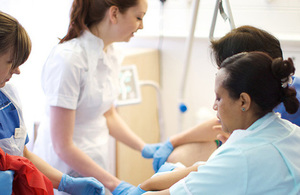Government has set out new educational funding to support nursing, midwifery and AHP students complete their courses and enter the future health workforce in order to meet the huge demand in the National Health Service.
Following a consultation on reforms to the education funding for nursing, midwifery and allied health professional (AHP) students, the government has set out its plans to keep healthcare courses accessible for all.
The government’s plan of action include: support for childcare costs, there will be an additional payment of £1,000 each year for students with child dependents to reflect that students undertaking clinical placements may have higher childcare costs than the wider student population.
Travel and dual accommodation – Government will provide healthcare students the £303 that they would have to pay upfront as an excess liable for student payment on the student loans system. The government will cover the cost of students who have to pay for secondary accommodation whilst attending clinical placements if the case for educational provision and value for money is demonstrated.
Postgraduate students – a bursary for tuition and maintenance will meet the full costs of the course for postgraduate students starting in 2017/18. This will be a transitional arrangement to secure the longer term workforce supply and the intention is for these courses to eventually fit the standard student funding model.
Exceptional hardship – Government will work with experts such as the RCN to provide bursary payments in cases of exceptional hardship, where students meet eligibility requirements.
Dental hygiene and dental therapy until a long-term funding solution is found for these subjects, the government will fund a capped number of dental hygiene and dental therapy students on the 2017/18 cohort on the same, non-repayable terms as under the current system.
Second undergraduate degrees – students who are planning to undertake nursing, midwifery and allied health professional subjects as a second degree will be able to access the standard student support system, on the same terms as students studying for a first degree.
The government believes that the mandatory clinical placement element of these courses is unique to healthcare students and means that these provisions are fair and reasonable.
Health minister Philip Dunne said: “Currently two thirds of people who apply to university to become a nurse are not offered a place – we are committed to plans which could create up to 10,000 training places for home-grown nurses, midwives and allied health professionals by the end of this parliament, with those in training getting around 25% more financial support while they study.
We’ve listened to feedback from the consultation and as a result will provide extra funding to help cover additional expenses like travel and more support for students with children. We will work with the RCN, hospitals and other partners in taking this forward.










